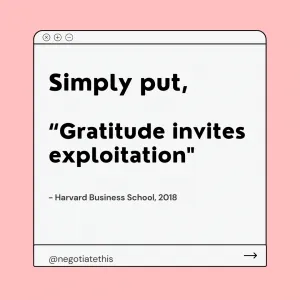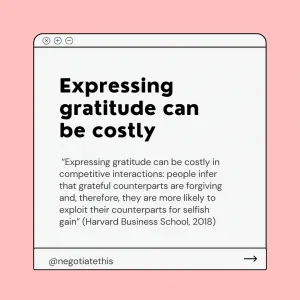Should I be grateful in my negotiation? The answer may just surprise you. While gratitude can greatly help social interactions, it may just need to take the backseat during negotiation.

While gratitude does have its place in the workplace, should you show appreciation and thanks to your boss while negotiating? Read on to discover why expressing gratitude can be detrimental in a negotiation.
In this article:
- Being Grateful Is A Weakness (In Negotiation)
- Being Grateful Is Great… Outside of a Negotiation
- Are You Desperate? Gratitude Can Make It Appear That Way
- Remain Neutral, Not Overly Grateful
- You Deserve What You’re Asking For
- You Can Still Say “Thank You”
To answer more of your negotiation questions, check out the post 4 Important Questions You Need Answered Before Your Negotiation
Being Grateful Is a Weakness (In Negotiation)
Gratitude can serve as a weakness within a negotiation. This seems counterintuitive, right? If we aren’t grateful and show gratitude, how will our superior know we appreciate the raise? If we don’t seem grateful, will they continue to give us an increase?
Despite what may seem intuitive, research shows that, “Expressing gratitude can be costly in competitive interactions: people infer that grateful counterparts are forgiving and, therefore, they are more likely to exploit their counterparts for selfish gain” (Yip, Lee, Chan, Brooks, 2018).
Being Grateful Is Great… Outside of a Negotiation
While being grateful is great, even in the workplace, think twice before bringing it into your negotiation. Simply put, “Gratitude Invites Exploitation” (Harvard Business School, 2018). Gratitude can have negative effects in a negotiation.

Are You Desperate? Gratitude Can Make It Appear That Way
Think of it this way. If you are expressing so much gratitude to your boss for considering a raise, it makes you seem desperate. Appearing overly grateful for something that you seemingly “deserve” begs the question – do you even deserve it?
If you have earned and truly deserve this raise, why are you thanking your boss so much? It’s you that did the hard work. Save the gratitude for a different career context.
Gratitude hinders your competitive advantage in a negotiation (Harvard Business School, 2018).

I have had two very different gratitude experiences while negotiating. The first time, I showed a lot of gratitude to my superior. I expressed how grateful I was for even considering an increase. Think: “Thank you, thank you, thank you so much.”
Even though my skills were through the roof, my demeanor opened the door “to exploit their counterparts for selfish gain” (HBS, 2018). And that is definitely what happened. I only received a fraction of what I had asked for.
Remain Neutral, Not Overly Grateful
In my following negotiation, I learned my lesson. I came in neutral, yet positive. Sure of my skills, I demonstrated all the reasons and examples of how I benefited the organization.
I wasn’t grateful, I had earned an increase. I wasn’t asking for favors, I was there to get what was rightfully mine.
At the end of the discussion, I politely thanked my negotiation collaborator for looking into an increase. I received my asking price.
Being neutral can take you places within a negotiation. Neutral does not mean negative. Neutral means you are asking for what you deserve. If you are overly grateful, the other party may incorrectly assume that you are asking for something you don’t quite deserve.
You Deserve What You’re Asking For
You deserve the money, the price, the raise, the rate… whatever it is you are negotiating for. You deserve it because you have earned it, because of your skillset, and because of whatever other justification you have.
STOP thanking your manager for your raise/ promotion/ job/ etc. You EARNED that.
Remember that in a negotiation, you are representing that you give more value than you receive from the company or transaction. That’s what makes you worth your asking price. You aren’t overly grateful because you aren’t doing anyone any favors – you want what you’re worth because of the value you provide.

You Can Still Say “Thank You”
All of this is not to say that a sincere “thank you” doesn’t go a long way in the workplace. It does. Just not at the negotiating table.
Show gratitude before you get to the negotiation table. That way, those you will be negotiating with already know you value them. If you are negotiating with the people you work with every day, you will want them to know they are valued beforehand (Harvard Law School, 2020).
If you want to show gratitude in the negotiation, thank them for their time. In this way, you are thanking them not for what they have “given” in monetary or other negotiation items, but for the time they have given attention to the matter and you. This is best given at the end when the negotiation has been agreed upon.
Be grateful for their time or for looking into an opportunity for you. But remember, you earned whatever you are asking for, so being overly grateful can show that maybe you are being given more than you deserve. Save your gratitude for your mentor or a close colleague who has helped you. And don’t forget to be grateful to the #1 person who got you to where you are in the first place – yourself.
Gratitude Should Take A Backseat During Negotiation
Should I be grateful in my negotiation? While gratitude can greatly help social interactions and be appropriate in other career contexts, leave it out of a negotiation.
Have you expressed gratitude in a negotiation? How did it serve you? Comment below.
Sources
- Article: “Does Small Talk in Negotiation Offer Big Gains? If you’re looking to offer big gains, then don’t discount the power of small talk in negotiation” (2020) @harvardlaw
Author: Pon Staff - Article: “Thanks for Nothing: Expressing Gratitude Invites Exploitation by Competitors”, Harvard Business School (2018) @hbs *working paper – draft form
Authors: Jeremy A. Yip, Ph.D., Kelly Kiyeon Lee, Ph.D., Cindy Chan, Ph.D., and Alison Wood Brooks, Ph.D. - Article: “The Power of a Simple Thank You in Negotiation: How a simple who of thanks can inspire future cooperation in negotiation” (2020), Program on Negotiation, Harvard Law School
Authors: Pon Staff - Article: “Dear Negotiation Coach: Before Saying Thank You, Think of the Context” (2017), Program on Negotiation, Harvard Law School
Authors: Pon Staff - Merriam-Webster Dictionary (2021)
Want More on Negotiation?
If you want weekly motivation and negotiation tips, sign up for blog posts and for daily inspiration follow @negotiatethis on Instagram. You got this. All you need is a little negotiation inspiration!
Want more negotiation tips? Check out these posts to help you in your next negotiation:
- 5 Tips: Focus On What You Can Control In a Negotiation
- 5 Easy Steps to Take If There Aren’t Any Funds Left
- 4 Reasons You Need to Track Your Work Wins and How They Help You Do Better in a Negotiation
- What Are Your Salary Expectations? How to Best Answer
- 7 Steps to Take When You Find Out You’re Underpaid
Disclaimer: While the contents of this post and blog come from research and personal experience, each experience, situation and/or person has their own unique circumstances. This is not negotiation, financial or any other form of legitimate or official advice from an expert. Each individual should do their own independent, comprehensive research. Negotiation, career and all other decisions are the sole responsibility of each individual or party. Details found on the blog and in individual posts are opinions and should be treated as such for entertainment purposes only. Read further disclaimer information in the footer and on the Disclaimer page.

